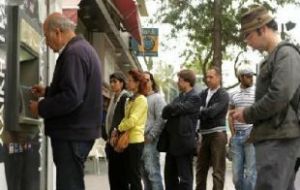MercoPress. South Atlantic News Agency
EU, ECB and IMF agree on a deal to bailout Cyprus; no Parliament vote
 Cypriots protest in the streets of Nicosia against conditions of the bail out
Cypriots protest in the streets of Nicosia against conditions of the bail out Euro-zone finance ministers have agreed a deal on a 10bn-Euro bailout for Cyprus to prevent its banking system collapsing and keep the country in the Euro-zone. Asian financial markets rose in early trading on news of the deal.
Laiki (Popular) Bank which is the country second-biggest will be wound down and holders of deposits of more than 100,000 Euros will face big losses. However, all deposits under 100,000 Euros will be “fully guaranteed”. The European Central Bank had set a deadline of Monday for a deal.
Laiki will be split into “good” and “bad” banks, with its good assets eventually merged into Bank of Cyprus.
The president of the Euro-group of Euro-zone finance ministers, Jeroen Dijsselbloem, told a press conference in Brussels the deal had “put an end to the uncertainty” around Cyprus's economy.
He added he was “convinced” the new deal was better for the Cypriot people than the broader measure rejected by the Cypriot parliament last week, as it focused on two problem banks rather than the entire sector.
All deposits under 100,000 Euros will be secured. But for those with deposits of more than that amount in the country's two biggest banks - Laiki and Bank of Cyprus - the deal will come as a bitter blow, our correspondent says.
The percentage to be levied on large deposits in the Bank of Cyprus will be resolved in the coming weeks, Mr Dijsselbloem said. One key element of the deposit tax, demanded by the IMF is that it not requires a parliamentary vote.
EU Commissioner for Economic Affairs Olli Rehn said that the “depth of the financial crisis in Cyprus means that the near future will be difficult for the country and its people”.
The deal came after hours of tense negotiations between Cypriot President Nicos Anastasiades and the “troika” of EU, European Central Bank and IMF leaders. Mr Anastasiades had reportedly asked the heads of the troika if they wanted him to quit.
“Do you want to force me to resign?” Cyprus News Agency quoted him as saying, citing sources at the presidential palace. “I am giving you one proposal, and you do not accept it. I give you another and it's the same. What else do you want me to do?” he was quoted as saying.
In another development on Sunday, Bank of Cyprus - the island's biggest lender - further limited cash machine withdrawals to 120 Euros a day.
With queues growing outside cash machines across the island, the second biggest lender, Laiki, also lowered its daily limit to 100 Euros, Cyprus News Agency reported. The bank's previous limit had been 260 Euros per day.
Banks have been closed since Monday and many businesses are only taking payment in cash. Mr Dijsselbloem said that the details of the re-opening of Cyprus' banks would be discussed on Monday by the Cypriot government and the troika.
Parliament rejected a bank levy on small and large deposits earlier this week. The levy that was rejected would have taken 6.75% from small savers and 9.9% from larger investors. It caused widespread anger among ordinary savers.
If a deal on an alternative agreement fails, the European Central Bank (ECB) says it will cut off funds to the banks, meaning they would collapse, possibly pushing the country out of the Euro-zone.
There is concern on the Mediterranean island that a levy on large-scale foreign investors, many of whom are Russian, will damage its financial sector. But leading Cypriot bankers have urged parliament to accept a levy, with small savers exempted.
Correspondents say Germany has pushed hard for a levy on investors who have benefited from high interest rates in recent years, rejecting a Cypriot plan to use money from pension funds.





Top Comments
Disclaimer & comment rules-

-

-

Read all commentsIf the Troika don't come in, the banks fail & everyone loses all their money, because the entire tiny country is something like eight times overleveraged.
Mar 25th, 2013 - 08:48 am 0Who will insure Argentina's banks for it's citizens?
The matresses. It's amazing how this endless speculation is permitted to always end the same way. With the loss of common people's money. Fine the bankers, make them pay up for speculation gone wrong, then you'll see they stop fooling around with other people's savings. The most worrying part is that nowadays, you are obliged to have a bank account...
Mar 25th, 2013 - 09:00 am 0Ok, so the German lead, EU monster has already got GREECE all sewn up by it's purse strings, and Italy too.... Now Cyprus.... It destroys democracy where ever it goes........
Mar 25th, 2013 - 06:08 pm 0who's next to have their democracy crushed, their banks closed and their people humiliated?
...........Spain???
Commenting for this story is now closed.
If you have a Facebook account, become a fan and comment on our Facebook Page!